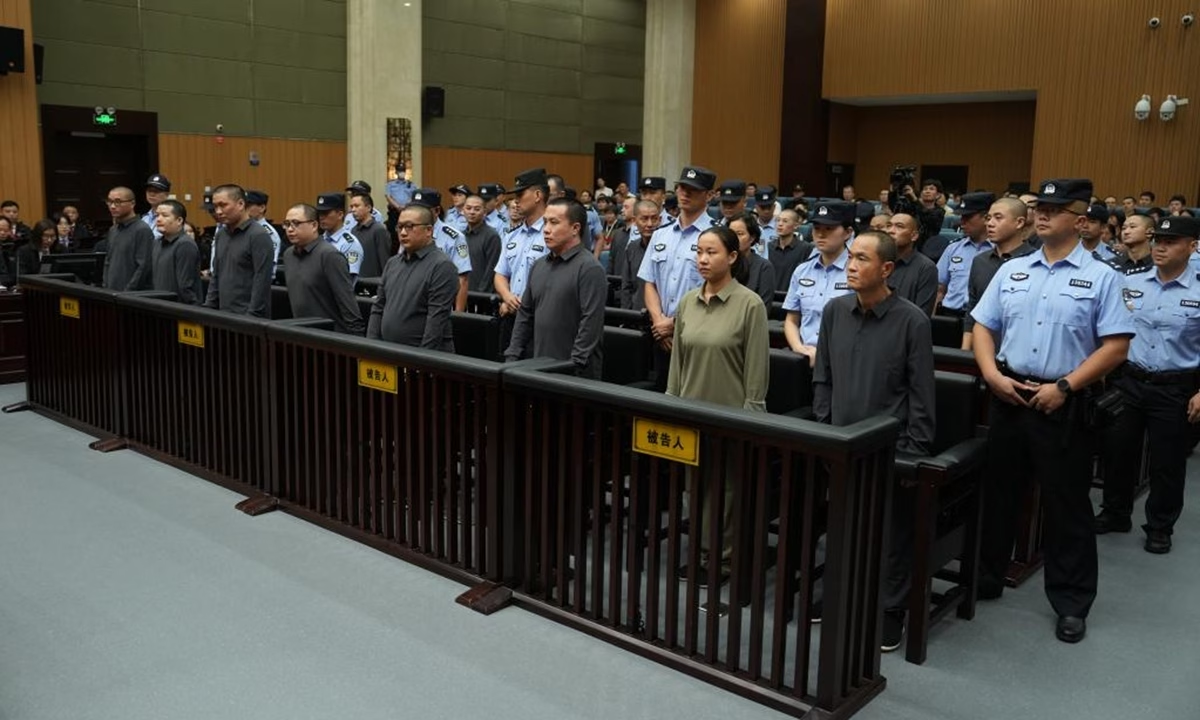The Intermediate People’s Court of Wenzhou in Zhejiang Province has delivered a landmark ruling in the Ming family criminal syndicate case, one of the most significant organised crime trials in recent years. Eleven defendants, among them Ming Guoping, Ming Zhenzhen, Zhou Weichang, Wu Hongming, Wu Senlong and Fu Yubin, received the death penalty. Other participants in the case were handed suspended death sentences, life imprisonment or fixed-term sentences ranging from five to 24 years. The penalties were accompanied by fines, property confiscations and, in some cases, deportation, according to China Central Television.
Years of Organised Criminal Activity
Court documents revealed that the syndicate had been active since 2015, with the Ming family at its centre. The leadership core included the late Ming Xuechang, Ming Guo’an who has been prosecuted separately, and siblings Ming Guoping and Ming Zhenzhen. Other relatives, including Bi Huijun, as well as armed operatives such as Zhou Weichang, played key roles in maintaining control over the organisation.
The network established a strong presence in Myanmar’s Kokang region. Using armed units under their command, they created a series of fortified compounds in Laojie, Shiyuanzi and Qingshuihe. These bases became hubs of criminal operations, providing a safe haven for financiers such as Wu Hongming, Luo Jianzhang and Jiang Ji. These financiers, backed by armed protection, poured money into illegal ventures.
Ming Crimes and Financial Scale
The syndicate engaged in a range of unlawful activities, including telecommunications fraud, narcotics smuggling, illegal gambling and organised prostitution. Investigators estimated the proceeds from these activities exceeded 10 billion yuan, the equivalent of roughly 1.4 billion United States dollars.
“Together with these financiers, the syndicate carried out crimes including telecom fraud, illegal gambling, drug trafficking and prostitution, involving more than 10 billion yuan ($1.4 billion) in illicit funds.”
Violence and Intimidation
The Ming family and its allies were also found responsible for extreme violence. According to evidence presented in court, they targeted individuals caught up in fraud schemes who attempted to escape or resist the syndicate’s authority. These acts of brutality led to the deaths of ten people and injuries to two others.
On 20 October 2023, the group staged an armed attack to prevent fraud suspects from being extradited to China. During the transfer of these suspects, Ming family gunmen opened fire, killing four people and wounding another four.
“On October 20, 2023, in order to prevent fraud suspects from being handed over to China, Ming family gunmen opened fire while transferring and hiding the suspects, causing four deaths and four injuries.”
Court’s Ruling
The Wenzhou court concluded that the key defendants, including Ming Guoping and Ming Zhenzhen, were either organisers or direct participants in the syndicate’s operations. Their actions amounted to 14 separate criminal offences, among them fraud, intentional homicide and intentional injury.
“The Intermediate People’s Court of Wenzhou ruled that defendants including Ming Guoping, Ming Zhenzhen, Zhou Weichang, Wu Hongming, Wu Senlong and Fu Yubin organized, led or participated in the criminal group’s activities, and their conduct constituted 14 crimes including fraud, intentional homicide and intentional injury.”
The severity of the charges, combined with the social damage caused, justified the range of sentences imposed, the court said.
Public and Political Attention
The scale of the case drew considerable public interest. More than 160 people were present at the trial, among them local legislators, political advisors, relatives of the accused and members of the general public.
“More than 160 people, including local legislators, political advisors, family members of the defendants and members of the public attended the trial.”
The case has highlighted how criminal groups can extend across borders, combining financial backers with armed power to build vast illicit networks. The sentences are expected to have a significant deterrent effect, but the trial also raises pressing questions about the persistence of such groups in the region, and the difficulty in dismantling them completely.

















